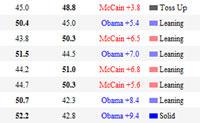Going Poll Crazy
Some polls show Barack Obama with a double-digit lead while others have John McCain even or ahead. Take Pennsylvania, where Obama and McCain are waging much tougher campaigns than one would expect in light of an 11-point average margin. That's because their internal polls show a much closer race. So how do you make sense of it all? The short answer is: You can't.
Some polls show Barack Obama with a double-digit lead while others have John McCain even or ahead. Take Pennsylvania, where both Obama and McCain are waging much tougher campaigns than one would expect in light of an 11-point average margin. That’s because their internal polls show a much closer race. So how do you make sense of it all? The short answer is: you can’t.
While it’s easy to disparage polls, the science of statistics is not a form of mysticism. Still, the sheer quantity and inconsistency of polls can drive a person mad. Here are a few thoughts on sorting out the mess.
Forget the popular vote: National polls are the least important. Presidents are chosen by electors, so if you want to know how Obama and McCain are doing, look at how they’re polling in, say, Colorado and Ohio, not across the board.
Not all polls are created equal: Pollsters aren’t just asking a random group of people for whom they’re going to vote, they’re making decisions about whom to talk to and how to balance their responses every step of the way. For example, some pollsters recently started calling cell phone numbers to keep up with changing demographics. These decisions greatly impact the polls. Check out fivethirtyeight.com’s pollster ratings to stay on top of the pollsters’ track records.
This election is unique: We’ve never had a nonwhite major-party nominee before. There are record-breaking voter registration drives across the country. YouTube didn’t exist in 2004. There are myriad forces affecting this election that are difficult to account for by looking to either political history or polls.
Good news can be bad news: The campaigns depend on a delicate balance of fear and enthusiasm to drive donations and voter turnout. The idea that Obama is somehow going to sweep the election is bad news for his campaign, and the notion that McCain is out of it is bad for his. When people are uncertain or anxious about a decision, they like to see what others are doing. It’s called social proof. It’s human nature to want to know how others are voting, but that shouldn’t stop citizens from analyzing the issues and then following their own consciences. The worst thing about polls is not that they’re often wrong, but that they interfere with a voter’s democratic instincts.
Your support matters…Independent journalism is under threat and overshadowed by heavily funded mainstream media.
You can help level the playing field. Become a member.
Your tax-deductible contribution keeps us digging beneath the headlines to give you thought-provoking, investigative reporting and analysis that unearths what's really happening- without compromise.
Give today to support our courageous, independent journalists.






You need to be a supporter to comment.
There are currently no responses to this article.
Be the first to respond.